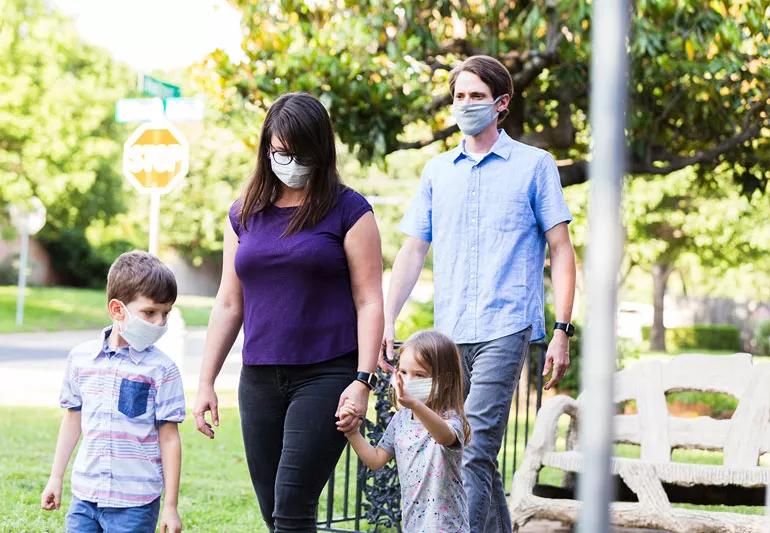The short answer from an infectious disease expert

Image content: This image is available to view online.
View image online (https://assets.clevelandclinic.org/transform/e7f96aca-7eaa-4551-a260-d03c2cb24379/familyMaskedWalk1-1249260069-770x533-1_jpg)
Family taking a walk while wearing masks
A: As the current coronavirus (COVID-19) pandemic stretches on with a secondary wave of cases following the re-opening of many states and cities, wearing a mask becomes an even more important part of daily life.
Advertisement
Cleveland Clinic is a non-profit academic medical center. Advertising on our site helps support our mission. We do not endorse non-Cleveland Clinic products or services. Policy
Remember: masks are not about protecting the wearer but, rather, protecting everyone else. This is especially important because so many carriers of the novel coronavirus — as many as 40%, according to one recent study — are asymptomatic and could otherwise be spreading the virus without even knowing it.
Wearing a mask creates a barrier that prevents the spread of droplets that carry the virus. Even if a cloth mask can’t catch every single droplet, it still significantly reduces the droplets a carrier propels into the air around them.
While these droplets usually drop to ground after traveling around six feet, coughing or sneezing can propel them upwards of 25-to-26 feet. A mask, combined with social distancing, greatly reduces the chances these droplets reach others around you and greatly decrease the odds of spreading the virus.
This makes it important to routinely wear masks when you’re in close proximity to others indoors, like at the grocery store or pharmacy. But what about when you’re simply outside, working in your garden or on a brisk, summer walk?
There’s certainly nothing wrong with wearing a mask any time you’re outdoors if you feel comfortable doing so. If you’re unlikely to be around anyone or will have the option of maintaining a safe distance from anyone you encounter, then a mask likely isn’t necessary but having one handy is a good idea just in case.
Advertisement
If you’re going to be around others, either in a crowd or in a situation where it will be difficult to maintain that six foot distance from others, you should wear a mask. That’s especially true if you’ll be doing any exercise or activity in which you might be breathing heavier than normal, thus possibly propelling those droplets from your mouth further than the usual distance.
It’s important to keep in mind, though, that a mask is no substitute for social distancing. The most effective way to prevent the spread of the virus is to combine mask-wearing with social distancing.
Advertisement

Delivered every Tuesday!
Sign up for our Health Essentials emails for expert guidance on nutrition, fitness, sleep, skin care and more
It's a letter about the news!

Every two weeks once
Sign up for our Health Essentials emails for expert guidance on nutrition, fitness, sleep, skin care and more.
Learn more about our editorial process.
Advertisement
The short answer: It’s complicated, but the basic care precautions still prevail, like washing your hands and isolating if you’re sick
They can feel like a typical headache or a migraine headache, but the pain can last for weeks to months
Any large social gathering — from a family birthday party to an indoor music concert — has the potential to spread serious infection
It’s important to connect with a healthcare provider, get quality sleep and balance your activities with your energy levels
Just like the flu, COVID-19 will continue to evolve every year
The duration varies, but symptoms can linger for a few days up to a couple weeks or more
Vaccination is best for prevention, but if you get sick with COVID-19, treatments are available
The virus lives best in humans, but it can last on hard surfaces, like doorknobs and railings
Type 2 diabetes isn’t inevitable with these dietary changes
Applying a hot or cold compress can help with pain
Pump up your iron intake with foods like tuna, tofu and turkey